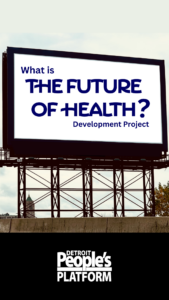City of Detroit’s FOH Website: https://detroitmi.gov/departments/planning-and-development-department/design-and-development-innovation/community-benefits-ordinance/ongoing-cbo-engagement/future-health-detroit
Read the update from Meeting #4 - https://www.detroitpeoplesplatform.org/economic-justice/future-of-health-update-racial-equity-framework/
 What is “The Future of Health”?
What is “The Future of Health”?
The Henry Ford Health (a hospital), Michigan State University (a college), and Pistons (a basketball team) development partnership involves rather disparate pieces merging together to form a $3 billion “live-work-play” project similar to the luxury real estate builds we’ve seen downtown and midtown led by the likes of Dan Gilbert and the Ilitch family. Tom Gores, who owns Platinum Equity and the Detroit Pistons, will benefit from the bulk of our investment of public tax resources to his private project.
About Tom Gores
“$8.1B Net Worth - Tom Gores oversees more than 40 companies with some $47 billion in assets through his Los Angeles-based private equity firm, Platinum Equity. In 2011 Gores and Platinum bought the NBA's Detroit Pistons. In August 2015 he purchased Platinum's stake, giving him 100% of the team's equity. Platinum Equity owns Aventiv/Securus, a prison phone company that has been targeted by activists for overcharging families.” Source: https://www.forbes.com/profile/tom-gores/, https://www.bloomberg.com/news/articles/2023-08-18/tom-gores-s-prison-phone-firm-aventiv-reports-improved-earnings#xj4y7vzkg)
Sidebar: What is a Private Equity Firm?
Tom Gores owns Platinum Equity. Private equity firms became popular during the 1970s and 1980s as a way for companies that weren’t doing well to make money. They provide financial backing in the private equity of companies through investment strategies. Private equity firms will acquire a controlling or substantial minority position in a company and then look to maximize the value of that investment. More: https://en.wikipedia.org/wiki/Private_equity_firm, https://www.forbes.com/advisor/investing/private-equity/
The Money
The “Future of Heath” will “require” about $273 million in tax breaks to happen. That’s about 9% of the total project cost. However, the Pistons, who plan to build three luxury residential buildings costing $322 million, will receive $220 million in tax incentives, which means 68% of the Pistons structures will be financed with public money. The Pistons project accounts for only 11% of the project but will be taking 81% of the tax incentives.
This is very important because the project is receiving a Transformational Brownfield which allows an investor to capture more taxes than normal to pay for the development. It is a super tax break! To be eligible for a Transformational Brownfield (the super tax break) in Detroit the project cost must be over $500 million. It is clear that without the partnership the Pistons developments (which only come to $322 million) would not be able to get a Transformational Brownfield, which means they would not be able to get nearly 70% of their project publicly financed. The $220 million in tax incentives the Pistons will receive is entirely due to the partnership.
The Process
Due to the size and public subsidies requested for the project, Detroit’s Community Benefits Ordinance process has been invoked. The process requires the seating of a Neighborhood Advisory Council (NAC) and negotiations between the developers and the NAC.
Updated Neighborhood Advisory Council
- (Chair) Lynda Jeffries - Appointed by Planning & Development
- (Co-Vice Chair) Venita Thompkins - Appointed by Council Member Mary Waters
- (Co-Vice Chair) Joanne Adams - Elected by Impact Area Residents
- (Admin) Marcus Keys - Appointed by Planning & Development
- Russell Howard - Appointed by Council President Mary Sheffield
- Lauren McNeary - Appointed by Council Member Coleman A. Young II
- Stephan Bobalik - Appointed by Planning & Development
- Gary Williams - Appointed by Planning & Development
- Benjamin Bennett - Appointed by Planning & Development (Promoted to full membership Nov 1)
Email the NAC: futureofhealthnac@gmail.com
NAC Facebook: https://www.facebook.com/profile.php?id=61552733011333
These are OUR Tax dollars! Participate!
Attend a Future of Health Community Benefits meeting.
This week, Wednesday Nov 1, 2023 – 6pmAll other meetings on Tuesdays at 6:00 PM
Note: NO meeting on November 21, the week of Thanksgiving.
University Prep High School, Ed Parks Campus
610 Antoinette St. Detroit, MI 48202
VIEW REMOTELY VIA ZOOM
Register to receive meeting link: https://bit.ly/futureofhealthdetroit
Dial by phone: +1 312 626 6799
Meeting ID: 873 4667 3162
About Public Funded Private Projects
Historically and across the nation, these types of development projects have upended the local economic and social conditions in communities amplifying racial inequities in nearby Black, Brown, and low-income neighborhoods. Detroit is no different. With more than 80% project subsidies and tax incentives going to Tom Gores, the Future of Health project must address the needs and priorities of Detroiters alongside those of the developer.
Detroit People’s Platform (DPP) and Equitable Detroit CBA Coalition are calling for a fair and equitable development process guided by a racial equity framework and a strong community centered Community Benefit Agreement (CBA). In the absence of these intentional strategies Detroit will further the slide into a city segregated by race, class, and wealth – a dystopian future by anyone’s measure.